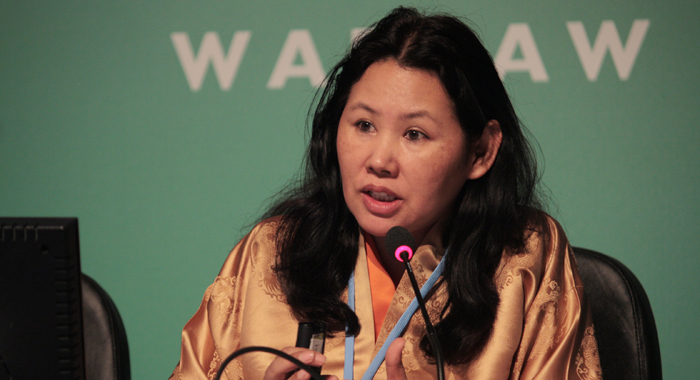
WARSAW, Poland — The Caribbean is said to have a relatively small but “very, very vocal” delegation at the climate change talks here, a source familiar with the closed-door negotiations says.
“For small island states, loss and damage is a major, major issue and at the same time, they are calling for maximum ambition to cope with emissions. That is the only way, at the end of the day, to prevent rising sea levels,” the source said, noting the peculiar challenges that a warmer globe poses for small island states.
And, Caribbean negotiators will be well advised to register their voices.
The source said that the devastation in the Philippines, where some 10,000 are feared dead after last weekend’s typhoon, is only expected to provide “more drama”, rather than impetus for binding agreements favouring small island developing states (SIDs), the most vulnerable to climate change.
This is the stark reality even as the Climate Finance talks next week are expected to build confidence in the ability of the Convention to deliver concrete support to enhanced actions on mitigation and adaptation in developing countries.
Caribbean and other SIDs might be well advised to hold their collective breath in light of the failure of developed nations to stick to their financial commitments to help poorer countries meet the 2015 deadline for achieving the Millennium Development Goals.
“I think you have talked to the heart of what we are going to over the next two weeks, the idea that there is a sum of resources that we are going to be talking about and developing countries getting a sense that there would be clarity and assurances that the resources would be there,” Dechen Tsering, coordinator, Finance, Technology and Capacity Building Programme at the United Nation Framework Convention on Climate Change (UNFCC) told journalists in response to a question about assurances being given to developing countries.
The UNFCCC has noted that the contributions of countries to climate change, and their capacity to prevent and cope with its consequences, vary enormously.
The Convention and the Protocol therefore foresee financial assistance from Parties with more resources to those less endowed and more vulnerable, the UNFCC, further says.
The aim is to scale up long-term finance commitment to US$100 billion per year by 2020 from a wide variety of sources.
“And I think how smoothly the resources go is how much confidence there is in both developed parties and developing country parties. … I followed the negotiations for many years and I see we need to do much more,” Tsering further said, adding, “… important building blocks are now being put in place.
“We are starting to look at enabling environments to start to mobilise resources in developing countries and we are looking at enabling environments for the deployment of resources, the effective utilisation of resources.
“So we are really starting to look at, in a much more detailed way, and there is a lot more confidence, a lot more work being done, the standing committee has contributed to a lot of it, they are looking at rationalising the financial mechanism, addressing issues like access to resources,” Tsering further said.
She said these issues of access include equity of access.
“So, the standing committee really is playing sort of an oversight function, and looking at the needs, looking at the strategies and approaches,” she further said.
The 19th session of the Conference of the Parties to the United Nations Framework Convention on Climate Change (UNFCCC) and the 9th session of the Conference of the Parties serving as the Meeting of the Parties to the Kyoto Protocol take place from Nov. 11 to 22.





